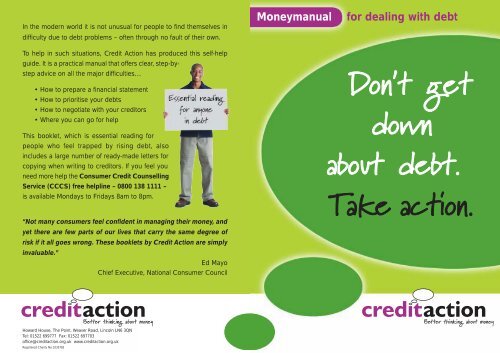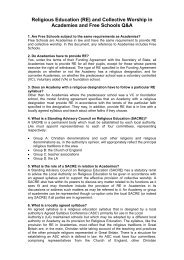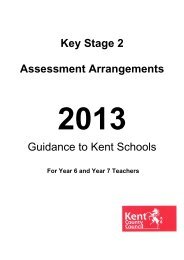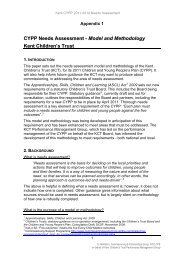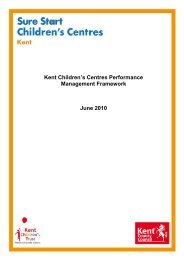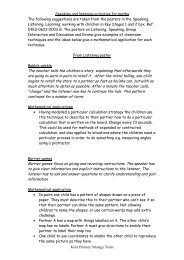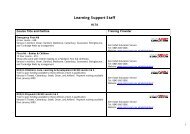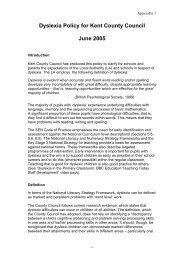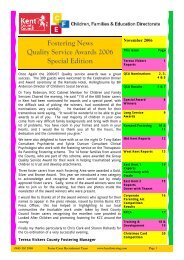Self Help Guide to dealing with debt - Kent Trust Web
Self Help Guide to dealing with debt - Kent Trust Web
Self Help Guide to dealing with debt - Kent Trust Web
Create successful ePaper yourself
Turn your PDF publications into a flip-book with our unique Google optimized e-Paper software.
In the modern world it is not unusual for people <strong>to</strong> find themselves in<br />
difficulty due <strong>to</strong> <strong>debt</strong> problems – often through no fault of their own.<br />
Moneymanual<br />
for <strong>dealing</strong> <strong>with</strong> <strong>debt</strong><br />
To help in such situations, Credit Action has produced this self-help<br />
guide. It is a practical manual that offers clear, step-bystep<br />
advice on all the major difficulties…<br />
• How <strong>to</strong> prepare a financial statement<br />
• How <strong>to</strong> prioritise your <strong>debt</strong>s<br />
• How <strong>to</strong> negotiate <strong>with</strong> your credi<strong>to</strong>rs<br />
• Where you can go for help<br />
This booklet, which is essential reading for<br />
people who feel trapped by rising <strong>debt</strong>, also<br />
includes a large number of ready-made letters for<br />
copying when writing <strong>to</strong> credi<strong>to</strong>rs. If you feel you<br />
need more help the Consumer Credit Counselling<br />
Service (CCCS) free helpline – 0800 138 1111 –<br />
is available Mondays <strong>to</strong> Fridays 8am <strong>to</strong> 8pm.<br />
“Not many consumers feel confident in managing their money, and<br />
yet there are few parts of our lives that carry the same degree of<br />
risk if it all goes wrong. These booklets by Credit Action are simply<br />
invaluable.”<br />
Ed Mayo<br />
Chief Executive, National Consumer Council<br />
Don’t get<br />
down<br />
about <strong>debt</strong>.<br />
Take action.<br />
Howard House, The Point, Weaver Road, Lincoln LN6 3QN<br />
Tel: 01522 699777 Fax: 01522 697703<br />
office@creditaction.org.uk www.creditaction.org.uk<br />
Registered Charity No.1035783
Notes<br />
Dealing<br />
<strong>with</strong> Debt<br />
Gordon Cook<br />
26
Contents<br />
Introduction 2<br />
Practical Steps<br />
Step 1 Contact all credi<strong>to</strong>rs 4<br />
Step 2 Decide priorities 5<br />
© 2004 Credit Action<br />
Published by<br />
Credit Action<br />
Howard House<br />
The Point<br />
Weaver Road<br />
Lincoln LN6 3QN<br />
Tel 01522 699777<br />
office@creditaction.org.uk<br />
www.creditaction.org.uk<br />
<strong>Help</strong>line 0800 138 1111 (operated by the Consumer Credit Counselling Service)<br />
First Published 1998<br />
Second Edition 2004<br />
Step 3 Prepare financial statement 7<br />
Step 4 Maximise income 9<br />
Step 5 Review expenditure 10<br />
Step 6 Negotiate <strong>with</strong> priority credi<strong>to</strong>rs 11<br />
Step 7 Negotiate <strong>with</strong> secondary credi<strong>to</strong>rs 14<br />
Court proceedings 18<br />
Conclusions 22<br />
Some dos and don’ts 24<br />
Notes 25<br />
Written by Gordon Cook<br />
Gordon is an experienced <strong>debt</strong> counsellor who has worked <strong>with</strong> Credit Action for many years.<br />
Design and production by Stephen Lown Graphic Designer<br />
Credit Action is a national money education charity dedicated <strong>to</strong> helping educate individuals and families in all<br />
aspects of money management. Credit Action works in partnership <strong>with</strong> another charity, Consumer Credit<br />
Counselling Service (CCCS), who answer all our helpline calls. CCCS is a charity dedicated <strong>to</strong> providing<br />
confidential, free counselling and money management assistance <strong>to</strong> financially distressed families and<br />
individuals.
Introduction<br />
This booklet is designed <strong>to</strong> help you<br />
deal <strong>with</strong> personal <strong>debt</strong> because there<br />
are many things you can do <strong>to</strong> regain<br />
control of your financial situation.<br />
Admitting that you are struggling and seeking help is an important first<br />
step <strong>to</strong>wards resolving your <strong>debt</strong> problems. Don’t be embarrassed or<br />
ashamed <strong>to</strong> disclose all your <strong>debt</strong>s and financial difficulties because ignoring<br />
the problem and not replying <strong>to</strong> correspondence will only make things worse.<br />
Your problems will not go away <strong>with</strong>out specific remedial action.<br />
Here are some positive things you can do; most of which are explained in<br />
more detail later in this booklet:<br />
• Stay calm and try not <strong>to</strong> feel guilty or afraid, even when threats are being<br />
made. Advice and support is available <strong>to</strong> guide you through your situation.<br />
Consumer Credit Counselling Service (CCCS) helpline on 0800 138 1111<br />
(freephone) is available Monday <strong>to</strong> Friday 8am <strong>to</strong> 8pm.<br />
Contact your local Citizens Advice (see telephone direc<strong>to</strong>ry for details).<br />
• Money problems often arise from or lead <strong>to</strong> family, health or emotional<br />
pressures and it is important that you seek professional help for these<br />
related problems <strong>to</strong>o.<br />
• KEEP GOING! Don’t despair – clearing your <strong>debt</strong>s can be a long process<br />
but the end result will be worthwhile and will put you back in control of your<br />
financial situation.<br />
We will now look in more detail at the PRACTICAL STEPS you can take <strong>to</strong><br />
resolve your <strong>debt</strong> problems.<br />
• Don’t be tempted <strong>to</strong> borrow more money <strong>to</strong> pay off existing <strong>debt</strong>s – this<br />
eventually creates even more problems – unless first seeking independent<br />
advice.<br />
• Make a list of all your credi<strong>to</strong>rs and <strong>debt</strong>s.<br />
• Prepare a statement of your financial position, detailing your income, living<br />
expenses and other commitments, and the balance (if any) available <strong>to</strong><br />
clear your <strong>debt</strong>s.<br />
• Communicate <strong>with</strong> your credi<strong>to</strong>rs so that they are aware of your situation –<br />
they will usually respond sympathetically <strong>to</strong> genuine problems once they<br />
are aware of them.<br />
• Communicate <strong>with</strong> your family and friends so that you can share your<br />
problems and work <strong>to</strong>gether <strong>to</strong>wards a solution.<br />
• Communicate <strong>with</strong> other agencies who can give you specialist advice –<br />
they do not charge for their services:<br />
2<br />
3
Step 1<br />
Contact all credi<strong>to</strong>rs<br />
Credi<strong>to</strong>rs cannot help you unless they are<br />
aware of your difficulties and circumstances. You<br />
may also need <strong>to</strong> ask them <strong>to</strong> confirm full details of<br />
the amount owing, actual arrears, penalty charges etc. The following is a<br />
typical letter:<br />
Your address<br />
Date<br />
Dear Sirs<br />
Account/Agreement Number<br />
I am currently experiencing financial difficulties due <strong>to</strong>................<br />
and I am therefore unable <strong>to</strong> maintain the full payment on my account. I am<br />
trying <strong>to</strong> resolve my situation and will send you a financial statement as soon<br />
as possible <strong>with</strong> the best payment offer I can manage.<br />
Please let me have the following information so that I can draw up a<br />
schedule of all my <strong>debt</strong>s and make appropriate offers <strong>to</strong> my credi<strong>to</strong>rs:<br />
Type of agreement (secured/unsecured)<br />
Balance owing<br />
Terms of repayment and interest/penalties accruing<br />
Arrears<br />
Any insurance policy attached <strong>to</strong> the agreement<br />
I will write <strong>to</strong> you again as soon as I have received replies from all<br />
my credi<strong>to</strong>rs.<br />
Yours faithfully<br />
When all the replies have been received draw up a<br />
schedule of your <strong>debt</strong>s and divide them between<br />
PRIORITY and SECONDARY credi<strong>to</strong>rs (see STEP 2 below). It<br />
is essential at this stage <strong>to</strong> mark any <strong>debt</strong>s where court orders<br />
(County Court Judgments or CCJs) have been made or a<br />
claim form received and seek specialist help as these<br />
<strong>debt</strong>s need immediate attention.<br />
Keep copies of all correspondence both sent and received.<br />
If any agreements are subsequently made by telephone get<br />
the name of the person you spoke <strong>to</strong> and ensure that the<br />
agreement is confirmed in writing.<br />
It is important <strong>to</strong> check that you are actually responsible<br />
for all your <strong>debt</strong>s. A husband and wife are not<br />
responsible for each other’s <strong>debt</strong>s unless they have<br />
both signed the agreement (except for Council Tax), and you<br />
cannot inherit a dead person’s <strong>debt</strong>s.<br />
You should also check the amount being claimed <strong>to</strong><br />
ensure all the payments you have made have been<br />
deducted, and challenge any excessive interest or<br />
penalty charges.<br />
Decide priorities<br />
Some <strong>debt</strong>s carry more severe penalties than<br />
others and this means that they must be dealt <strong>with</strong><br />
first. Priority treatment is not determined by the size of the <strong>debt</strong>, the period or amount<br />
of arrears or the threats being made, but by the actual legal remedy the credi<strong>to</strong>r has<br />
against you for recovery. A PRIORITY <strong>debt</strong> is usually defined as one where nonpayment<br />
can result in you:<br />
• being imprisoned<br />
• losing your home<br />
• losing essential goods or services.<br />
Step 2<br />
On the next page is a list of priority <strong>debt</strong>s and the legal consequences of non-payment.<br />
4<br />
5
Type of <strong>debt</strong><br />
Mortgage/secured loan<br />
Rent<br />
Gas/electricity<br />
Water<br />
Council tax<br />
CSA/maintenance orders<br />
Magistrates fines<br />
Inland Revenue and VAT<br />
Final sanction for non-payment<br />
Loss of house<br />
Eviction<br />
Disconnection/fitting of prepayment meter<br />
Since the Water Act, 1999, the supply<br />
cannot be disconnected, but we<br />
recommend that this is regarded as<br />
essential expenditure, and treated<br />
as a priority payment.<br />
Taken from wages/benefits; bailiffs;<br />
imprisonment<br />
Taken from wages/benefits; imprisonment<br />
Bailiffs; imprisonment<br />
Bailiffs; bankruptcy, imprisonment<br />
Before you make offers of payment <strong>to</strong> any credi<strong>to</strong>rs you will need<br />
<strong>to</strong> prepare a financial statement – see STEP 3 below.<br />
Prepare financial<br />
statement<br />
Step 3<br />
It is essential that you now prepare a statement of your<br />
actual current financial position. A specimen is shown on<br />
the following page and can be adapted <strong>to</strong> suit your<br />
particular situation. Your statement must include all<br />
income received from whatever source and all<br />
money going out and <strong>to</strong> where. When completing this form use either weekly or<br />
monthly figures, but don’t mix them and mark clearly on the statement which basis you<br />
have used.<br />
PRIORITY credi<strong>to</strong>rs must be dealt <strong>with</strong> before any offers or payments are made on<br />
SECONDARY <strong>debt</strong>s. SECONDARY <strong>debt</strong>s are all those which do not carry the above<br />
sanctions. For example:<br />
Type of <strong>debt</strong><br />
Credit/s<strong>to</strong>re cards<br />
Personal loan (unsecured)<br />
Bank loan/overdraft<br />
Hire purchase*<br />
Credit sale<br />
Catalogue**<br />
Pawnbroker<br />
Loan shark***<br />
Loan from family/friends***<br />
Final sanction for non-payment<br />
County Court Judgment<br />
County Court Judgment<br />
County Court Judgment<br />
Loss of goods<br />
County Court Judgment<br />
County Court Judgment<br />
Keep pledge<br />
Not legally enforceable unless licensed<br />
County Court Judgment<br />
* If the threatened goods are an essential requirement, for example a washing machine or car<br />
needed for work, such a <strong>debt</strong> must be treated as priority, but if you have paid less than one third<br />
of the <strong>to</strong>tal owed under the hire purchase agreement the credi<strong>to</strong>r can repossess the goods<br />
<strong>with</strong>out a court order.<br />
** Catalogue <strong>debt</strong>s may be difficult <strong>to</strong> enforce as it is not always standard practice <strong>to</strong> complete<br />
a formal credit agreement, and credi<strong>to</strong>rs should be asked <strong>to</strong> produce a copy of this if proceedings<br />
are threatened.<br />
*** Individual circumstances may suggest some other <strong>debt</strong>s be treated as priority, although not<br />
legally enforceable, e.g. money owed <strong>to</strong> family, friends or loan sharks.<br />
• To change weekly figures <strong>to</strong> monthly, multiply by 52 and then divide by 12.<br />
• To change monthly figures <strong>to</strong> weekly multiply by 12 and then divide by 52.<br />
Annual payments such as TV licence, road tax, insurance premiums etc. should be<br />
divided by 12 <strong>to</strong> give the monthly amount or by 52 for the weekly figure.<br />
Also allow for irregular, and often unexpected, expenditure such as<br />
car and house maintenance, repairs and replacements.<br />
It is important <strong>to</strong> take everything in<strong>to</strong> account, but don’t include<br />
payments for arrears or secondary credi<strong>to</strong>rs at this stage<br />
because you need <strong>to</strong> know the <strong>to</strong>tal money you have<br />
available (if any) <strong>to</strong> make offers <strong>to</strong> them.<br />
Before finalising your statement you must review your<br />
INCOME <strong>to</strong> see if it can be increased in any way (see<br />
STEP 4 page 9) and consider your EXPENDITURE <strong>to</strong><br />
ascertain if any savings can be made (see STEP 5<br />
page 10).<br />
Your financial statement (see over) will need <strong>to</strong> be<br />
constantly revised <strong>to</strong> reflect changes in your income and<br />
expenditure and <strong>to</strong> incorporate subsequent agreements<br />
for payments <strong>to</strong> be made <strong>to</strong> your credi<strong>to</strong>rs.<br />
6<br />
7
FINANCIAL STATEMENT<br />
Date prepared<br />
Name<br />
Address<br />
Number of adults in household<br />
Number of children in household<br />
INCOME weekly/monthly<br />
You Partner Total<br />
Wages<br />
Part-time job<br />
Child Benefit<br />
Job Seeker’s Allowance<br />
Disability and Sickness Benefit<br />
Pension<br />
Child Maintenance paid <strong>to</strong> you<br />
Rent or money from lodgers<br />
Other<br />
Other<br />
Total Household Income<br />
EXPENDITURE weekly/monthly<br />
PRIORITIES<br />
Amount spent<br />
Mortgage/Rent/Board<br />
2nd Mortgage/Secured Loan<br />
Endowment Policy<br />
Child Maintenance Paid by You<br />
Council Tax<br />
Water Charges<br />
Electricity<br />
Gas<br />
Service Charges/Ground Rent<br />
Court Fines/County Court Judgments<br />
Vehicle Finance/Hire Purchase<br />
Television Licence<br />
<strong>Self</strong> Employed<br />
Income Tax<br />
National Insurance<br />
VAT<br />
LIVING COSTS<br />
Food and Housekeeping<br />
School Meals/Meals at Work<br />
Clothing/Footwear<br />
Vehicle Running Costs (Tax, Insurance, etc.)<br />
Petrol/Diesel<br />
Fares (Bus, Train, etc.)<br />
Telephone<br />
Rentals (TV, Video, etc.)<br />
Prescriptions/Dentist/Optician<br />
Childminder/Nursery<br />
School Costs<br />
Cigarettes/Alcohol<br />
Life Insurance/Pension/Investments<br />
Building/Contents Insurance<br />
Other<br />
TOTAL HOUSEHOLD COSTS (1)<br />
TOTAL HOUSEHOLD INCOME (2)<br />
TOTAL LEFT AFTER TAKING (1) FROM (2)<br />
Maximise income<br />
Be sure that you have included everything, and then<br />
consider if you can obtain any additional income.<br />
Possibilities might be:<br />
• Job Seekers Allowance – if you are unemployed or<br />
have been made redundant.<br />
• Child Tax Credit and Working Tax Credit – if you have<br />
children or if you are working but on a low<br />
Step 4<br />
income.<br />
• Income Support – is available <strong>to</strong> people on low incomes and who meet certain<br />
criteria relating <strong>to</strong> work, sickness, age, savings etc. Check <strong>with</strong> your local<br />
Department for Work and Pensions (DWP) whether you are entitled <strong>to</strong> this.<br />
8<br />
9
• Incapacity or disablement<br />
benefits, including mobility or<br />
attendance allowance.<br />
• Income Tax – check your code,<br />
particularly if your circumstances<br />
have changed, as you may be<br />
entitled <strong>to</strong> a rebate.<br />
• Maintenance – are you entitled <strong>to</strong> this? Contact the Child<br />
Support Agency.<br />
• Housing Benefit and Council Tax relief. Your local council can<br />
advise on eligibility for these.<br />
• What about part-time work or taking in a lodger?<br />
• Can grown-up children or non-dependants contribute<br />
<strong>to</strong>wards the household expenses?<br />
Seek help from the Department for Work and Pensions (DWP),<br />
your local council, Inland Revenue or phone the helpline<br />
number found in the INTRODUCTION if you are not sure of<br />
your entitlement.<br />
Income maximisation is a very important part of the<br />
<strong>debt</strong> resolution process and credi<strong>to</strong>rs will want <strong>to</strong> be<br />
reassured that you have considered all the options.<br />
Step 5<br />
Review expenditure<br />
It is important <strong>to</strong> include all household<br />
expenditure and financial commitments in<br />
your statement, whether regular or irregular.<br />
Variable items such as fuel bills should be<br />
averaged out over the year and the use of budget<br />
plans, stamps or <strong>to</strong>kens may assist <strong>with</strong> this.<br />
against using public transport. For example, is it essential for travel <strong>to</strong> work, school,<br />
shopping etc. as other means of transport are not available? Leisure and holiday costs<br />
may also be challenged by credi<strong>to</strong>rs, along <strong>with</strong> expenditure on cigarettes, alcohol,<br />
lottery, pets etc.<br />
Once again check your expenditure carefully <strong>to</strong> be sure that everything is included and<br />
all reasonable savings have been made. Try and make your expenses less than your<br />
income, otherwise your <strong>debt</strong>s will continue <strong>to</strong> grow. However, do be realistic, as you<br />
may have <strong>to</strong> live on this budget for several years, so concentrate on reducing nonessentials<br />
rather than basics such as food and heating.<br />
On completion of your income and expenditure review you can now finalise your<br />
financial statement before sending it <strong>to</strong> your credi<strong>to</strong>rs as part of your negotiations <strong>with</strong><br />
them (see STEP 6 below and STEP 7 page 14).<br />
Negotiate <strong>with</strong><br />
priority credi<strong>to</strong>rs<br />
On completion of your financial statement deduct your<br />
<strong>to</strong>tal expenditure from your <strong>to</strong>tal income <strong>to</strong> see what<br />
money (if any) you have <strong>to</strong>wards clearing your <strong>debt</strong>s.<br />
Step 6<br />
If you are in arrears you will first need <strong>to</strong> negotiate <strong>with</strong><br />
your priority credi<strong>to</strong>rs (see STEP 2 page 5 for<br />
definition) and this should be done quickly <strong>to</strong><br />
prevent implementation of their sanctions. Even if legal proceedings for recovery have<br />
commenced it is never <strong>to</strong>o late <strong>to</strong> make an offer and seek a voluntary agreement.<br />
List all your priority <strong>debt</strong>s and send this schedule, along <strong>with</strong> your financial statement,<br />
<strong>to</strong> each priority credi<strong>to</strong>r. This letter should detail the reasons for your financial<br />
difficulties and include a reasonable offer for payment of arrears, provided there is<br />
surplus money available. A suggested letter is as shown on page 12.<br />
Credi<strong>to</strong>rs may challenge amounts spent on food, fuel, clothing, travel etc. so is<br />
there any way that you can reduce these <strong>to</strong> realistic levels in relation <strong>to</strong> the size and<br />
circumstances of your family? The cost of running a car may need <strong>to</strong> be justified<br />
10<br />
11
Dear Sirs<br />
Account/Agreement Number<br />
I am experiencing financial difficulties because.....................................<br />
I enclose a financial statement detailing my current situation <strong>to</strong>gether<br />
<strong>with</strong> a schedule of all my priority credi<strong>to</strong>rs.<br />
When negotiating <strong>with</strong> your credi<strong>to</strong>rs:<br />
• You should not offer all your available income <strong>to</strong> one credi<strong>to</strong>r.<br />
• Start your negotiations <strong>with</strong> the <strong>debt</strong> nearest <strong>to</strong> its final sanction.<br />
Your address<br />
Date<br />
You will appreciate that it is necessary for me <strong>to</strong> make an offer <strong>to</strong> each<br />
of these credi<strong>to</strong>rs therefore I am able <strong>to</strong> pay you £...... per week/month.<br />
If you will confirm your agreement in writing I will commence payments<br />
immediately. Please also advise me of the method and due date for such<br />
payments.<br />
Yours faithfully<br />
• Don’t feel obliged or pressurised <strong>to</strong> pay more than you can afford, as it is important<br />
<strong>to</strong> sustain the payments once agreed.<br />
• Do not divulge account and reference details <strong>to</strong> anyone other than the credi<strong>to</strong>r<br />
concerned.<br />
• Even if credi<strong>to</strong>rs don’t agree <strong>to</strong> your initial offer start paying as it will begin <strong>to</strong> reduce<br />
your arrears and may persuade them <strong>to</strong> change their minds if they see that you are<br />
serious in your intentions.<br />
• Ensure that you get a receipt for all payments made and any verbal agreements<br />
must be confirmed in writing.<br />
As payment is agreed <strong>with</strong> each credi<strong>to</strong>r you should include this in your financial<br />
statement so that other credi<strong>to</strong>rs can see your current situation and you can adjust <strong>to</strong><br />
living <strong>with</strong>in your new budget.<br />
If you have no surplus income for priority credi<strong>to</strong>rs after re-assessing your<br />
budget you must still contact them and support your position <strong>with</strong> your financial<br />
statement. You should remember that some credi<strong>to</strong>rs have the legal right <strong>to</strong> make<br />
direct deductions from wages or income support via the Department for Work and<br />
Pensions (DWP).<br />
For ‘fuel’ <strong>debt</strong>s, pre-payment meters allow the arrears <strong>to</strong> be collected over a period of<br />
time and are a way of avoiding disconnection.<br />
For mortgages and secured loans the following options should be explored:<br />
• Never abandon your property or hand the keys back <strong>to</strong> the lender.<br />
• Always contact your mortgage lender at the first sign of a problem and continue <strong>to</strong><br />
keep them informed of any changes in your circumstances.<br />
• ‘Interest only’ or other reduced payments for a limited period of time.<br />
• Capitalise the arrears.<br />
• If your financial situation is improving, seek <strong>to</strong> repay the arrears over an agreed<br />
period of time.<br />
• Consider re-mortgaging on a different basis, e.g. transferring from an endowment<br />
<strong>to</strong> a repayment mortgage, but be careful <strong>to</strong> check and compare terms and<br />
conditions, initial and longer-term interest rates, early redemption penalties,<br />
administration charges etc.<br />
• Voluntary sale of the home will usually<br />
produce a higher price than forced sale after<br />
repossession, but consideration must first<br />
be given <strong>to</strong> alternative accommodation as<br />
the local authority may decide that you have<br />
intentionally made yourself homeless. Such<br />
a sale may not always produce sufficient equity <strong>to</strong> clear the<br />
outstanding mortgage/loan and you may still be legally liable<br />
for the balance, even if the lender agreed <strong>to</strong> the sale.<br />
12<br />
13
Step 7<br />
Negotiate <strong>with</strong><br />
secondary credi<strong>to</strong>rs<br />
After agreeing offers of repayment for all your<br />
priority <strong>debt</strong>s, your financial statement should be updated<br />
<strong>to</strong> see if you have any disposable income <strong>to</strong> pay your non-priority <strong>debt</strong>s (see<br />
STEP 2 page 5 for definition). The fairest way <strong>to</strong> divide this amount (if any) amongst<br />
the secondary credi<strong>to</strong>rs is in proportion <strong>to</strong> the <strong>to</strong>tal amount they are owed. List these<br />
remaining <strong>debt</strong>s on a summary sheet (see example overleaf) and add up the <strong>to</strong>tal of<br />
the secondary <strong>debt</strong>s. The <strong>to</strong>tal available disposable income is then apportioned <strong>to</strong><br />
these credi<strong>to</strong>rs by the following method:<br />
£4,000.00 x £100.00 = £40.00<br />
£10,000.00<br />
You may find it helpful <strong>to</strong> use a calcula<strong>to</strong>r <strong>to</strong> complete this schedule.<br />
Using the figures you have calculated you can make an offer <strong>to</strong> each secondary<br />
credi<strong>to</strong>r. A typical letter is shown below and this should be supported by a copy of the<br />
<strong>debt</strong> schedule and your financial statement.<br />
Individual <strong>debt</strong><br />
Total <strong>debt</strong>s<br />
x Disposable income = Offer<br />
Dear Sirs<br />
Your address<br />
Date<br />
Account/agreement number:<br />
The example given below assumes you have £100.00 per month available for all<br />
secondary credi<strong>to</strong>rs:<br />
SCHEDULE OF SECONDARY CREDITORS<br />
Name:<br />
Date:<br />
CREDITOR AMOUNT OWED OFFER<br />
(per month)<br />
£ £<br />
ABC Catalogue 2,000.00 20.00<br />
Northern Loans 3,000.00 30.00<br />
Right Car Finance 1,000.00 10.00<br />
Flexible Credit Card 4,000.00 40.00<br />
TOTAL 10,000.00 100.00<br />
You will be aware from my earlier letter that I am experiencing financial<br />
difficulties due <strong>to</strong>..................................................................<br />
I enclose a copy of my current financial statement which includes payment of<br />
arrears <strong>to</strong> my priority credi<strong>to</strong>rs. I also enclose a schedule of all my secondary<br />
<strong>debt</strong>s from which you will see the available money has been apportioned on<br />
a pro rata basis.<br />
I ask that you will accept this offer of £...... per month and s<strong>to</strong>p interest or other<br />
charges accruing in order that the payments will begin <strong>to</strong> reduce the <strong>debt</strong>.<br />
Please confirm your acceptance in writing and advise me how the payments<br />
should be made.<br />
Thank you in anticipation.<br />
Yours faithfully<br />
Using the above formula the calculation for the Flexible Credit Card would be:<br />
14<br />
15
It is important that credi<strong>to</strong>rs can see that you have treated each of them fairly so don’t<br />
be pressurised or threatened in<strong>to</strong> increasing individual offers at the expense of other<br />
credi<strong>to</strong>rs. There is usually a reluctance <strong>to</strong> freeze interest and other charges but there<br />
is little point in paying if the outstanding balance continues <strong>to</strong> rise so try writing again<br />
as follows:<br />
Dear Sirs<br />
Your address<br />
Date<br />
Your address<br />
Date<br />
Account/agreement number<br />
Thank you for your letter dated............................<br />
Dear Sirs<br />
Account/agreement number<br />
Thank you for accepting my offer of repayment but I am disappointed that<br />
you have not agreed <strong>to</strong> freeze the interest on the account. As you will<br />
appreciate, if the interest is not s<strong>to</strong>pped then the balance on the account will<br />
continue <strong>to</strong> rise and I will never be able <strong>to</strong> repay the <strong>debt</strong>. I would ask,<br />
therefore, that you reconsider your decision and advise me accordingly.<br />
Yours faithfully<br />
I am sorry that you feel unable <strong>to</strong> accept my offer. The majority (or all) of<br />
my other credi<strong>to</strong>rs have accepted and payments <strong>to</strong> them have commenced.<br />
I cannot offer you more as you will see from my financial statement that I<br />
have only £................. in <strong>to</strong>tal <strong>to</strong> divide between all my credi<strong>to</strong>rs and it would<br />
be unfair <strong>to</strong> favour your company at the expense of others who have agreed<br />
<strong>to</strong> my offer.<br />
Please reconsider your decision in the light of what the other credi<strong>to</strong>rs<br />
have accepted.<br />
Yours faithfully<br />
If your bank is a secondary credi<strong>to</strong>r it may be necessary <strong>to</strong> open an account elsewhere<br />
if possible and redirect your wages so that you can have access <strong>to</strong> them. Direct debits<br />
will also need <strong>to</strong> be transferred as the bank may s<strong>to</strong>p paying them.<br />
Start payments as soon as they are agreed in writing <strong>with</strong> your credi<strong>to</strong>rs and remember<br />
that keeping up regular payments is essential, even if they are small.<br />
If your circumstances deteriorate further and you cannot sustain payments then<br />
prepare a revised financial statement, re-calculate your offers in line <strong>with</strong> your current<br />
available disposable income and write <strong>to</strong> your credi<strong>to</strong>rs again explaining the change in<br />
your circumstances.<br />
If a credi<strong>to</strong>r will not accept your initial offer you can write <strong>to</strong> them as follows:<br />
Often credi<strong>to</strong>rs will agree <strong>to</strong> reduced payments for a limited period of time, for example<br />
three <strong>to</strong> six months. If your circumstances haven’t improved by the end of this period<br />
then let them know and continue existing payments. Otherwise prepare an updated<br />
financial statement and re-calculate your offers as explained above.<br />
If you have no disposable income for secondary credi<strong>to</strong>rs then write and inform<br />
them explaining your circumstances and sending your financial statement <strong>to</strong> confirm<br />
your situation. Agree <strong>to</strong> contact them again if your circumstances improve. In the<br />
meantime ask them <strong>to</strong> freeze interest charges. You could ask them <strong>to</strong> consider writing<br />
off the <strong>debt</strong> or accepting a reduced settlement, although they are unlikely <strong>to</strong> do so in<br />
the early stages. Make a <strong>to</strong>ken offer of payment <strong>to</strong> each credi<strong>to</strong>r of £1 per month.<br />
Include the first payment <strong>with</strong> the letter and continue <strong>to</strong> make monthly payments. This<br />
shows that you want <strong>to</strong> do what you can <strong>to</strong> pay what is due. You could write as follows:<br />
16<br />
17
Dear Sirs<br />
Your address<br />
Date<br />
Always complete and return court documents <strong>with</strong>in the specified time so that the court<br />
is aware of your problems and overall financial situation and will be able <strong>to</strong> take these<br />
in<strong>to</strong> consideration when making an order.<br />
Always attend court hearings <strong>to</strong> ensure that your case is properly represented. The<br />
case will normally be heard in a private room <strong>with</strong> officials who are used <strong>to</strong> <strong>dealing</strong> <strong>with</strong><br />
these matters – they are not there <strong>to</strong> serve the interests of the credi<strong>to</strong>r alone.<br />
Account/agreement number<br />
I am experiencing financial difficulties because.....................................<br />
I enclose a copy of my financial statement from which you will see that after<br />
meeting essential expenditure there is no available income <strong>with</strong> which I can<br />
make you an offer except a <strong>to</strong>ken payment of £1 a month as a gesture of<br />
goodwill. I enclose the first payment and ask that you send me a payment<br />
book.<br />
If my circumstances improve in the future I will contact you again but in the<br />
meantime will you freeze the interest charges and consider whether you will<br />
write off the <strong>debt</strong>?<br />
Yours faithfully<br />
The aim of this booklet is <strong>to</strong> help you avoid court proceedings but what happens if<br />
negotiation fails and your credi<strong>to</strong>rs resort <strong>to</strong> legal action? It is not a crime just <strong>to</strong> owe<br />
money and <strong>with</strong> certain exceptions (see STEP 2 page<br />
5) you can’t go <strong>to</strong> prison if you are unable <strong>to</strong> pay.<br />
Your case will normally be heard in the county<br />
court which is not a criminal court. The court<br />
is not there <strong>to</strong> punish you but <strong>to</strong> ensure<br />
fairness between the borrower and lender. So<br />
don’t be afraid of court action – it can often help<br />
solve your problem because you do have some<br />
legal rights.<br />
Court<br />
proceedings<br />
It is helpful <strong>to</strong> be represented in court, but don’t worry if you cannot afford a solici<strong>to</strong>r,<br />
just contact your local Citizens Advice who may be able <strong>to</strong> arrange assistance or refer<br />
you <strong>to</strong> alternative agencies who can assist <strong>with</strong> court representation. Alternatively,<br />
contact the CCCS helpline mentioned in the INTRODUCTION.<br />
If court action is taken against you:<br />
• You will receive a claim form stating what your credi<strong>to</strong>r claims from you.<br />
• If you do owe the money, return the form of reply attached <strong>to</strong> the claim form <strong>to</strong> the<br />
credi<strong>to</strong>r saying how much you can pay. Complete the financial statement on the<br />
back of the claim form and make sure you explain your circumstances fully.<br />
• If you dispute some or all of the <strong>debt</strong> say why on the form provided.<br />
• If the credi<strong>to</strong>r accepts your offer they will tell the court and you<br />
will then get an order (a judgment – CCJ) from the court telling<br />
you <strong>to</strong> pay at the rate you offered.<br />
• If the credi<strong>to</strong>r refuses your offer the court decides how much<br />
you pay from the information you have provided. If they tell<br />
you <strong>to</strong> pay more than you have offered you can ask for a<br />
hearing <strong>to</strong> explain your situation in more detail. You have<br />
fourteen days <strong>to</strong> ask for this.<br />
• If necessary, seek advice in <strong>dealing</strong> <strong>with</strong> court<br />
documents but don’t ignore them otherwise a<br />
decision will be made <strong>with</strong>out the court being<br />
aware of your actual circumstances and<br />
financial situation.<br />
18<br />
19
• Special considerations apply if the court hearing is for re-possession of or eviction<br />
from your home – seek immediate help as there are still things you can do at this<br />
stage.<br />
Other aspects of <strong>debt</strong> recovery procedures which you may become involved <strong>with</strong> are:<br />
Debt collection agencies<br />
Rather than accept your offer of repayment the credi<strong>to</strong>r may refer your account <strong>to</strong> a<br />
<strong>debt</strong> collec<strong>to</strong>r. Do not be pressured, bullied or threatened by them in<strong>to</strong> paying more<br />
than you can afford. Stand firm on your offer and refer <strong>to</strong> the financial statement sent<br />
<strong>to</strong> the credi<strong>to</strong>r. Collec<strong>to</strong>rs have no legal right of<br />
entry <strong>to</strong> your home and cannot remove goods.<br />
Undue harassment is illegal and should be<br />
reported <strong>to</strong> your local Trading Standards<br />
Department.<br />
Bailiffs<br />
If you fail <strong>to</strong> make payments under a CCJ<br />
(England & Wales) or a Decree (Scotland) the<br />
court will grant Warrant of Possession Order or<br />
Summary Warrant respectively. Bailiffs or Sheriff<br />
Officers may be directed by the court <strong>to</strong><br />
implement the order by removing goods <strong>to</strong><br />
the value of the <strong>debt</strong> and costs, dependant<br />
upon the administrative actions conducted by<br />
the credi<strong>to</strong>r via the court. You do not have <strong>to</strong> let a<br />
bailiff in<strong>to</strong> your home and they cannot break in<br />
(unless they have entered previously for that <strong>debt</strong>). They can legally enter through a<br />
door or window that you have left open. Only bailiffs recovering <strong>debt</strong>s owed <strong>to</strong> the<br />
State (e.g. Income Tax and VAT) can force entry <strong>to</strong> your home. Even at this late stage<br />
it may be possible <strong>to</strong> negotiate satisfac<strong>to</strong>ry terms for payment <strong>with</strong> the bailiff. As an<br />
alternative the court can grant an Attachment of Earnings Order <strong>to</strong> deduct money<br />
directly from your wages.<br />
Credit reference agencies<br />
They keep records of some unpaid <strong>debt</strong>s and a register of all county court judgments.<br />
Most companies will check <strong>with</strong> an agency before giving credit. You can obtain a copy<br />
of your record from the Agency and if it is wrong it can be corrected and when you pay<br />
off a CCJ you can have your record marked accordingly. Full details of these<br />
procedures are contained in a free booklet entitled ‘No Credit?’ which you can get<br />
from: No Credit leaflet, PO Box 99, Nelson BB9 8GS. Tel: 0870 4421211.<br />
Magistrates Court<br />
Certain types of <strong>debt</strong> can be recovered through the Magistrates Court (e.g. council tax<br />
arrears and unpaid fines). The procedure will vary but once again you must respond<br />
<strong>to</strong> all court documents and immediately seek professional advice. The magistrates<br />
have the ultimate sanction of imprisonment for some <strong>debt</strong>s, although this is only used<br />
as a last resort.<br />
Administration Orders<br />
If you have a number of small <strong>debt</strong>s (maximum £5,000 in <strong>to</strong>tal) you can apply <strong>to</strong> the<br />
court for an Administration Order. This means that you pay the court one regular<br />
amount and they distribute it <strong>to</strong> the credi<strong>to</strong>rs on your behalf, although a small charge<br />
is made. A court judgment has <strong>to</strong> be entered against you before you can apply.<br />
Bankruptcy/Individual Voluntary<br />
Arrangement (IVA)<br />
Bankruptcy is a way of <strong>dealing</strong> <strong>with</strong> <strong>debt</strong>s, enabling you eventually <strong>to</strong> make a fresh<br />
start and, at the same time, making sure your assets are shared out fairly amongst your<br />
credi<strong>to</strong>rs. A number of assets are au<strong>to</strong>matically protected under Bankruptcy/<br />
Sequestration <strong>with</strong> the Official Receiver having discretion over others. However, you<br />
will probably lose some of your assets, there will be costs involved in the process and<br />
restrictions on your future activities so the situation needs very careful consideration<br />
and you should seek professional advice before making a decision. Your credi<strong>to</strong>rs can<br />
also petition for a Bankruptcy Order and, if this is the case you need <strong>to</strong> seek help<br />
immediately.<br />
20<br />
21
An IVA is another way of resolving a <strong>debt</strong> problem. The equivalent in Scottish Law is a<br />
<strong>Trust</strong> Deed. Certain criteria must be met and there are costs involved. You must also<br />
have some means of making an offer <strong>to</strong> credi<strong>to</strong>rs. Seek professional advice before<br />
embarking on this complex procedure. The best people <strong>to</strong> see regarding an IVA/<strong>Trust</strong><br />
Deed would be suitably qualified Insolvency Practitioners, Chartered Accountants or<br />
Solici<strong>to</strong>rs. With regards <strong>to</strong> the way in which assets may be protected in an IVA/<strong>Trust</strong><br />
Deed we suggest that you discuss this <strong>with</strong> the Insolvency Practitioner/Chartered<br />
Accountant who should be able <strong>to</strong> advise which assets could be excluded from the<br />
arrangement <strong>with</strong>out detriment <strong>to</strong> the agreement.<br />
Conclusions<br />
The future<br />
The path <strong>to</strong> clearing your <strong>debt</strong>s, or even<br />
avoiding them, may be quite short for some.<br />
On the other hand, you could be faced <strong>with</strong><br />
several years of hardship before you are able <strong>to</strong><br />
clear them. In either case you need <strong>to</strong> identify the<br />
cause of your problem. Most people fall in<strong>to</strong> <strong>debt</strong> through no<br />
fault of their own. It is often as a result of redundancy or reduced working hours,<br />
illness or marriage breakdown. However, it may be that you found<br />
using credit cards was <strong>to</strong>o easy or you were unable <strong>to</strong> resist<br />
offers of interest-free credit.<br />
One of the key things <strong>to</strong> remember is that<br />
family pressures will arise. Not only will you<br />
have less money, but your stress and<br />
anxiety levels are likely <strong>to</strong> increase. It is<br />
important <strong>to</strong> realise that this is perfectly natural and<br />
understandable so please don’t be afraid <strong>to</strong> seek help and<br />
medical advice if necessary. Try <strong>to</strong> keep yourself occupied.<br />
You might find it helpful <strong>to</strong> join a local support group if there<br />
is one in your area.<br />
Opposite are a few practical suggestions for saving money<br />
and staying out of <strong>debt</strong> in the future.<br />
Suggestions for saving money<br />
• Only buy on a cash basis – if you can’t afford something save up for it.<br />
• When you go <strong>to</strong> buy something ask yourself whether you really need it<br />
or just want it. Try waiting for thirty days before you buy anything and<br />
if you decide you are going <strong>to</strong> buy it try and obtain one or two<br />
quotations <strong>to</strong> compare prices.<br />
• When you go shopping prepare a list and keep <strong>to</strong> it.<br />
• Keep you financial statement up <strong>to</strong> date and live <strong>with</strong>in it.<br />
• Look for ways <strong>to</strong> improve your income whilst trying <strong>to</strong> reduce your<br />
expenditure.<br />
• Keep your own accounts and always check your bank statement.<br />
• Budget for non-regular bills and expenses. By paying some bills, for<br />
example gas and electricity, by direct debit you au<strong>to</strong>matically receive<br />
a small discount.<br />
• Educate all members of your family in managing their own finances –<br />
you could be preventing much heartache in future years.<br />
• Start a regular savings plan – no matter how small the amount.<br />
REMEMBER – if <strong>debt</strong>s start <strong>to</strong> build up again seek immediate help before things get <strong>to</strong>o<br />
far out of hand.<br />
22<br />
23
Some dos<br />
and don’ts<br />
✔ DO be realistic – face up <strong>to</strong> your true<br />
situation and resolve <strong>to</strong> deal <strong>with</strong> it – using the<br />
help available <strong>to</strong> you.<br />
Notes<br />
✔ DO get in <strong>to</strong>uch <strong>with</strong> your credi<strong>to</strong>rs immediately <strong>to</strong><br />
explain your difficulties.<br />
✔ DO give priority <strong>to</strong> those <strong>debt</strong>s which may result in you losing your home, fuel<br />
supplies or your liberty.<br />
✔ DO remember that your credi<strong>to</strong>rs prefer small payments regularly rather than<br />
larger, irregular payments that you cannot sustain.<br />
✔ DO reply <strong>to</strong> credi<strong>to</strong>rs’ letters and court documents <strong>with</strong>in the time period specified<br />
and let them have all the facts.<br />
✔ DO keep copies of all correspondence, financial statements, <strong>debt</strong> schedules etc.<br />
✔ DO attend and/or be represented at court hearings and take all relevant<br />
correspondence <strong>with</strong> you, including your current financial statement.<br />
✘<br />
DON’T ignore the problem – it won’t go away.<br />
✘<br />
DON’T give up trying <strong>to</strong> reach agreement <strong>with</strong> your credi<strong>to</strong>rs even if they are<br />
difficult and refuse your initial offers.<br />
✘<br />
DON’T be threatened or bullied in<strong>to</strong> making promises which you cannot fulfil.<br />
✘<br />
DON’T borrow more money <strong>to</strong> pay off your <strong>debt</strong>s, especially by taking on more<br />
credit or s<strong>to</strong>re cards.<br />
✘<br />
DON’T be afraid <strong>to</strong> ask for specialist advice – it’s FREE (see telephone number in<br />
the INTRODUCTION <strong>to</strong> this booklet).<br />
24<br />
25


